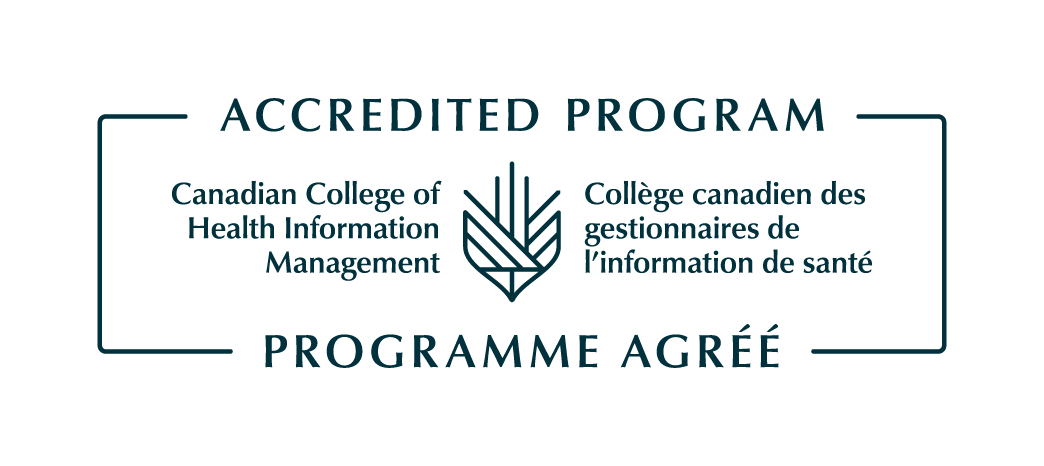
Health Information Management (HIM) professionals connect the worlds of health and data and ensure we accurately tell the health story of each patient.
Start date
- Full-time studies (over 2 years) - September to June (71 weeks)
- Part-time studies (over 3, 4, or 5 years) - start your studies with general courses in any term and then join the HIM studies in September
Length
You can complete your studies in HIM over 2, 3, 4 or 5 years. If you choose to complete the program in 2 years, it is recommended that you study full-time and are not employed during this timeframe.
Completion requires 71 weeks (120 credits and 1805 hours) of study. Please contact our office at 1-306-775-7639 for more information about start dates and study options.
Location(s)
ReginaOnline/Distance options availableLength and location notes
Some programs offered online or otherwise by distance (i.e., correspondence) include on-site labs, clinicals, practicums or work experiences. They may be offered course-by-course or full-time, or both, and deliveries may change over time.
The importance of quality health information to make crucial decisions is ever present for health care professionals and leaders. Society is dependent on health information to guide many aspects of our daily lives. Our HIM program will prepare you with the skills and knowledge to be at the forefront of managing critical health information.
HIMs professionals work in a variety of settings. They are leaders of healthcare teams and work as practitioners, coordinators or analysts within health authorities, cancer and government agencies. They work as privacy and informatics analysts, in educational settings, and in public health surveillance. This unique skill set can also open doors to roles with police forces, law, insurance and pharmaceutical firms.
Specific competencies that you will develop through the program include:
- Data collection and coding;
- Electronic health information management;
- Information privacy, security and confidentiality;
- Interpretation and analysis of health data;
- Access to and protection of health information; and
- Record and systems management.
Delivery format
The full-time, onsite, in-person cohort is offered at the Regina campus with the full time classes being 60% onsite and 40% online. The onsite program is located in Regina and is open to international students.
The part-time, online format offers a flexible format for those working full time or those with significant personal responsibilities. The online program is offered between three to five years. Our team is there to guide you along your journey and to assist you with designing the course plan that works for you.
Applied learning
Diploma to degree
Ladder your diploma into the Bachelor of Applied Management degree at Saskatchewan Polytechnic with only two years of additional study. Remote classes and part-time options are available.
Your HIM diploma is a great start in your life-long learning journey and allows you to transfer into a variety of degree programs and to be considered for the graduate studies at the Johnson-Shoyama Graduate School of Public Policy.
Career and salary information
Your career
Health Information Management graduates work as information management practitioners, coordinators and analysts in many different areas of health care including hospital admitting, quality management, research and statistics, information systems, utilization management and risk management. Look for positions with health regions, government agencies, community clinics, long-term care facilities, home care agencies and mental health or outreach programs. Or transfer your skill set into other areas such as education, law enforcement, insurance and research.
Potential careers
| Sample job title | NOC classification |
|---|---|
| Health information management practitioner | Health information management occupations (12111) |
| Information management technician | Records management technicians (12112) |
| Health program information analyst | Health policy researchers, consultants and program officers (41404) |
Part-time delivery
The online program is available to part-time students only.
You can choose a path to complete your studies in three, four, or five years (part time). The part-time option is designed in a flexible format to allow you to meet your own professional and personal goals. The program must be completed within five years, and has multiple pathways for part-time students.
Classes are offered through the core HIM program and through the Arts and Sciences department. Courses offered through the Arts and Sciences department may be offered throughout the year. Although the program typically starts the last week in August, both part-time and full-time students can also choose to take classes from the list at the bottom of this page throughout the year.
Out-of-province students will ideally have their practicums in their home province. It may take up to a year to place out-of-province students in practicum sites in their home province, so early communication is essential.
Students who have not yet applied to the program may take some classes as unclassified students. While the program officially starts in late August of each year, classes are also available outside of the normal start date in: November, January, March and May. You may take the following courses as an unclassified student prior to being accepted into the program:
- APHY 100
- APHY 200
- COMP 174
- COMP 175
- COMP 176
- COMM 262
- ENGL 100 or ENGL 101
- MED 161
Admissions
Admission requirements
- Grade 12 with a minimum overall average of 70% in the following subjects: English Language Arts A30, English Language Arts B30, Foundations of Math 30 or Pre-Calculus 30*, one 30-level science (one of Biology, Chemistry or Physics)
- Minimum 25 net words per minute keyboarding speed with 90% accuracy (5-minute testing
report to be submitted with transcripts)
- Gross words per minute minus errors per minute indicates net words per minute
- Testing is available through a Saskatchewan Polytechnic Testing Services. A completed Keyboarding Test Results Form must be submitted to Enrolment Services.
- Computer Science 30, Information Processing 30, or equivalent classes taken within the past five years may also be considered in lieu of the keyboarding test.
- English Language Requirement for Health Information Management (See program-specific ELP)
Note
- Accepted applicants will be required to provide evidence of a Criminal Record Check upon admission into the program. At the discretion of the practicum/clinical agency, you may be declined access to a clinical or work placement based on the contents of the Criminal Record Check. The cost of the Criminal Record Check is your responsibility.
- Practicum placements are located throughout Saskatchewan or in a student’s home province; therefore, all students must be willing to relocate in order to complete their practicum experiences.
- Accepted applicants are required to provide evidence of 2015 WHMIS Globally Harmonized System (GHS) certification upon admission into the program. Recertification will be required every three years to remain current. The cost of WHMIS certification is your responsibility.
*Previous Saskatchewan mathematics requirement also accepted:
- one 30-level math
Alternative admission
Applicants who do not possess the academic qualifications for a program may be admitted if evidence of probable success can be established through an alternative admission assessment. Applicants are automatically considered for alternative admission. However, some specific admission requirements may still need to be met.
ACCUPLACER©
Refer to the ACCUPLACER© cut scores for this program below, and review additional details concerning Alternative Admission using Accuplacer.
- 250 Arithmetic
- 258 Quantitative Reasoning, Algebra, and Statistics
- 256 Reading
- 250 Writing
- 5 Writeplacer
Post-secondary
Some programs allow applicants to meet the admission grade level requirement using 15 approved post-secondary credits. Review additional information.
Admission method
First Qualified/First Admitted
The First Qualified/First Admitted (FQFA) process is used for the majority of Saskatchewan Polytechnic programs. When we determine that you meet the program's admission requirements, you will be offered admission based on the date you fully qualify for the program. The earlier you provide the appropriate documents and information that qualify you for admission to the next intake, the earlier you might begin your studies.
Applications for all FQFA programs open September 1 each year.
Sponsored programs or programs targeted to specific groups do not accept applications year round or maintain an application pool.
See Admission Processes for more information about this method of admission.
Tuition and fees
Estimates are based on current rates and are subject to change. Amounts for a program may vary by campus. Totals shown here include all mandatory fees as well as approximate cost for books and supplies. Visit the Tuition and Fees web page for a complete breakdown of tuition and fees for this program.
2025-26 academic year
Year 1 - $10,380
Year 2 - $8,780
Courses
Students must be admitted to the program before taking CLIN 101 or PATH 272.
Get credit for what you know
Prior Learning Assessment and Recognition
Saskatchewan Polytechnic recognizes that adults learn in many different ways. This includes acquiring knowledge and skills through life and work experience or non-formal training.
See link(s) below to get more information about PLAR.
Transfer credit
Many Sask Polytech students benefit from transferring course credit. You may be eligible to transfer credit to Sask Polytech or to another college or university.
| Institution | Details |
|---|---|
| Athabasca University | Graduates of this program may be eligible for block transfer of 36 credit units toward a Bachelor of Health Administration Post Diploma degree program. |
| Thompson Rivers University | Graduates of this program may be granted a maximum of 60 transfer credits into the Bachelor of Health Science. |
| Toronto Metropolitan University (formerly Ryerson University) | Graduates of this program with a 70% GPA may earn credit in the Bachelor of Health Administration. |
Student awards
Thanks to the generosity of donors and alumni, Saskatchewan Polytechnic gives away more than $2 million in student awards during the academic year.
Saskatchewan Polytechnic offers student awards for every certificate and diploma program at every campus. Not all student awards are based on marks - some are based on financial need or things like community or volunteer involvement.
Accreditation
Canadian Health Information Management Association (CHIMA)

Health Information Management is the only diploma program in Saskatchewan accredited by the Canadian Health Information Management Association (CHIMA). Having a CHIMA-recognized diploma qualifies you to write the national certification exam and gain industry recognition as a Health Information Management (HIM) professional.

